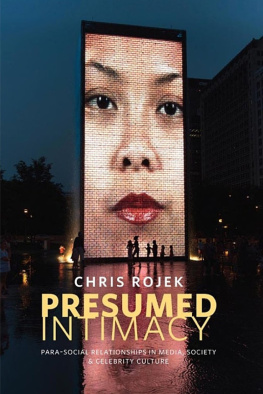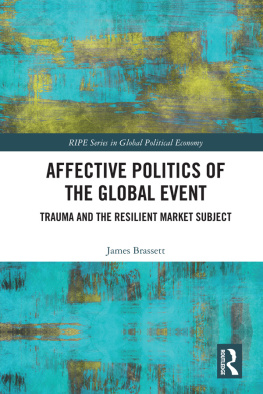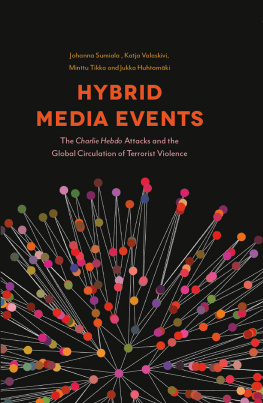SAGE Publications Ltd
1 Olivers Yard
55 City Road
London EC1Y1SP
SAGE Publications Inc.
2455 Teller Road
Thousand Oaks, California 91320
SAGE Publications India Pvt Ltd
B 1/I 1 Mohan Cooperative Industrial Area
Mathura Road
New Delhi 110 044
SAGE Publications Asia-Pacific Pte Ltd
3 Church Street
#10-04 Samsung Hub
Singapore 049483
Editor: Mila Steele
Editorial assistant: James Piper
Production editor: Imogen Roome
Copyeditor: Jane Fricker
Proofreader: Katie Forsythe
Marketing manager: Michael Ainsley
Cover design: Jen Crisp
Typeset by: C&M Digitals (P) Ltd, Chennai, India
Printed in India at Replika Press Pvt Ltd
Chris Rojek, 2013
First published 2013
Apart from any fair dealing for the purposes of research or private study, or criticism or review, as permitted under the Copyright, Designs and Patents Act, 1988, this publication may be reproduced, stored or transmitted in any form, or by any means, only with the prior permission in writing of the publishers, or in the case of reprographic reproduction, in accordance with the terms of licences issued by the Copyright Licensing Agency. Enquiries concerning reproduction outside those terms should be sent to the publishers.
Library of Congress Control Number: 2012955760
British Library Cataloguing in Publication data
A catalogue record for this book is available from the British Library
ISBN 978-0-85702-517-3
ISBN 978-0-85702-518-0 (pbk)
A revolutionary age is an age of action; ours is the age of advertisement and publicity.
Soren Kierkegaard
One can trust anyone who babbles the jargon; people wear it in their buttonholes.... Simply to be there becomes the merit of the thing.
Theodor Adorno
Narcissism and the direct satisfaction of impulses are major obstacles to the emergence of any collectivity worthy of the name.
Serge Moscovici
It is not clear to me how advanced large-scale societies can fulfil the requirements of expressivism, other than by holding Nuremberg rallies.
Ernest Gellner
PREFACE: THE GOODWILL NEWSLETTER
Global events are the most heart-warming goodwill newsletter of modern times. Periodically, they burst into social consciousness as part of an established cycle of global festivity (the Olympics, the FIFA World Cup, the Rio Carnival, the Sydney Mardi Gras) or in response to an international emergency or incident (Live Aid, Tsunami Relief, the Benefit Concert for Hurricane Katrina). For the duration we are conscious of being part of an international community in which pre-ordained divisions of race, class, religion, sexual orientation, politics and the vulture logic of capitalism appear to magically vanish. Instead, the urge to do good, which is an entirely human and proper sentiment, is hot wired into disinterestedly celebrating the athletic prowess of Olympians or world class professionals in sport; feeding the hungry in Africa; ending torture in Darfur; providing relief from the misery and want that follows an earthquake or tsunami; saving the planet from pollution and corporate greed; or more prosaically, conveniently reminding ourselves at the company meeting that we are truly serving the customer and doing good, rather than merely maximising profit. The point about disinterest is revealing, because event logic is built on highly personal displays of emotional energy. Participation in events has become a mark of responsible citizenship, with all of the subsidiary implications for judgements of self-worth, validity and ethically acceptable behaviour that this implies.
Events are designer-built packages to boost publicity, symbolise fraternity and heighten awareness. Increasingly, global events employ celebrities to transfer glamour from the entertainment sector onto charitable and business undertakings.
The organisers and front men and women that present them see themselves as providing positive pedagogy (teaching us about third world inequality and injustice), enhancing social networking and contributing to cultural literacy.
Success in entertainment is redefined as honing a strong humanitarian, global perspective. For example, in Sydney (2011), the Global Leadership Forum brought George Clooney and Martha Stewart together with Muhammad Yunus, Russell Simmons, Michael Fertik and Jeff Taylor and put them on the stage of the Sydney Convention Centre to unwrap the concepts, vision and motivation behind authentic leadership and provide challenging new ways of thinking, working Ordinary men and women are urged to learn how admired members of the powerful and influential draw on strong, cleansing emotions and apply them to higher business and humanitarian causes. In a world in which people are often triply estranged from government, the state and big business, global events are cheerful testaments to people power. The Forum celebrated the best practice of celebrity trend setters in humanitarian and business enterprise and conjured a spirit of presumed intimacy between strangers. For a moment we are team-world, and there is no obstacle of nature, faith, church, economy or polity that we cannot overcome.
The desire to do good is magically combined with the satisfaction of feeling good. Events contribute to a positive self-image. They possess therapeutic value. Their scale and importance has ascended in direct proportion to the expansion of social and cultural injunctions to get more in touch with our feelings and to emote frankly and without shame. Ernest Gellner (1994) once speculated that as human societies develop more efficient and dependable infrastructures of security, the struggle for survival is replaced with a struggle for approval and acceptance. If he is right, global events are the biggest human-made objects of approval and acceptance ever devised. The Olympics, the FIFA World Cup, Live Aid, Live Earth, Live 8 and their cognates are catalysts for deep emotional arousal and exchange. They issue licence to break out of our daily bubble of existence and allow us to express our no-holds barred common humanity. It is as if global events supply ordinary men and women with the intimation that the 7 billion people on the planet constitute the fundamental human entity, beyond the walls of nation, race, class and religion.
Yet events are neither spontaneous nor free expressions of people power. They are closely organised, schooled in the methods of exercising persuasion over human cognition by market research, rigorously planned and monitored in detail. Events are publicised as expressions of people power, but event ownership and management do not rest with the people. To be sure the entire category of the event audience is problematic. The mixtures of stadium crowds and network publics constitute an illusory community, in which unity and commitment are largely apparitions.
Many commentators increasingly point to the control functions of events. Events are portrayed as radiant, symbolic representations of civil society coming together. In reality, they apply principles of hierarchical authority and keep citizens at arms length from mega-project decision making (Flyvbjerg et al., 2003: 5). Citizens are not directly involved in planning, commercialisation and securitisation. In cyclical events like the Olympics and FIFA World Cup, the use of CCTV (closed circuit television) and UAVs (unmanned aerial vehicles) is a standard part of the security package. Global events are actually among the most controlled, regimented settings devised.










